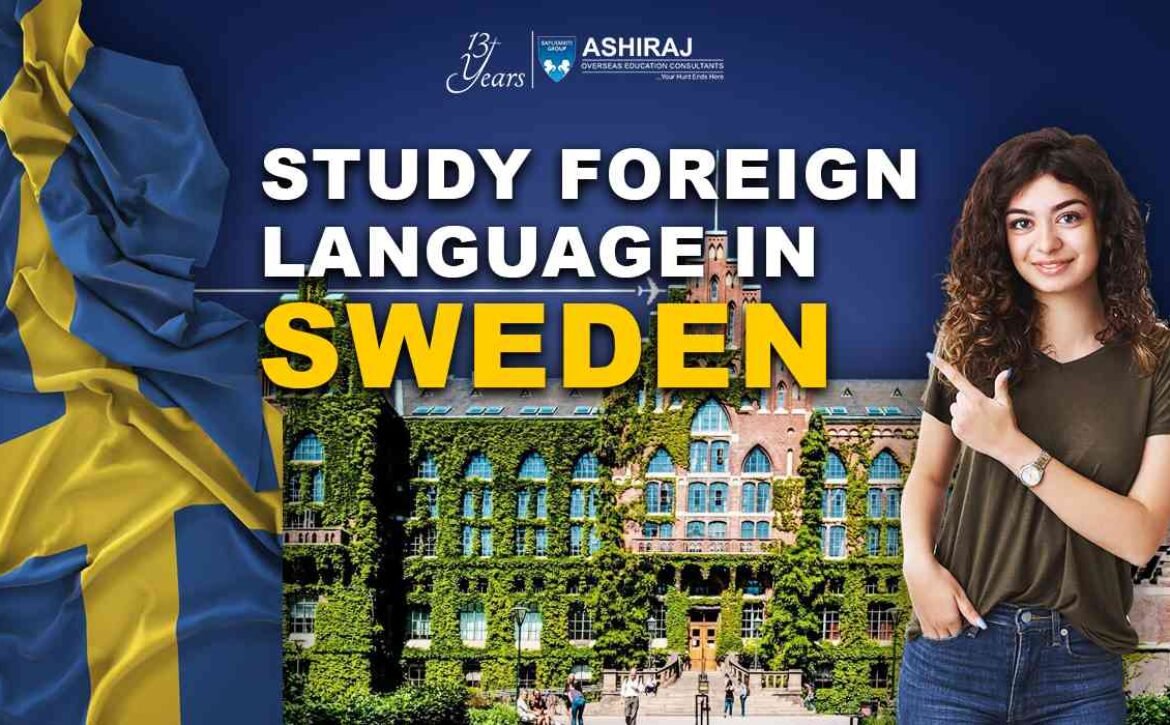
Foreign Language in Sweden
In Sweden, the embrace of foreign languages reflects a dynamic cultural landscape and a pragmatic approach to global communication. From the early stages of education, Swedish students engage with foreign languages, recognizing their importance in fostering international connections and enhancing personal and professional opportunities. The integration of foreign languages into Sweden’s educational system underscores the nation’s commitment to multilingualism and global engagement.
In workplaces and academic institutions across Sweden, proficiency in foreign languages is increasingly valued, with English emerging as a lingua franca in many spheres of society. Beyond English, Swedish individuals often pursue proficiency in languages such as German, French, Spanish, and Mandarin, reflecting diverse interests and international ambitions. The emphasis on foreign language acquisition not only facilitates cross-cultural understanding but also strengthens Sweden’s position in the global arena, fostering collaboration and exchange on a multinational scale. As Sweden continues to navigate a rapidly evolving global landscape, its commitment to foreign language education remains integral to its identity as a progressive and internationally connected society.
Why Study Foreign Language in Sweden?
- Enhanced Global Communication: Proficiency in foreign languages opens doors to effective communication with people from diverse cultural backgrounds, promoting understanding and collaboration.
- Career Opportunities: In Sweden’s interconnected global economy, knowledge of foreign languages enhances employability across various industries, including tourism, trade, diplomacy, and technology.
- Cultural Enrichment: Learning a foreign language provides insights into different cultures, traditions, and perspectives, fostering cultural awareness and empathy.
- Academic Advantages: Many universities and academic institutions in Sweden offer programs and courses taught in foreign languages, providing students with access to a broader range of educational opportunities.
- Personal Development: Studying a foreign language stimulates cognitive abilities, improves problem-solving skills, and enhances memory retention, contributing to overall cognitive development.
- International Mobility: Proficiency in foreign languages facilitates travel and relocation, enabling individuals to immerse themselves more fully in different countries and communities.
- Global Networking: Language proficiency creates opportunities for networking and establishing connections with individuals and organizations worldwide, enriching personal and professional networks.
- Competitive Edge: In a globalized job market, proficiency in foreign languages sets individuals apart from their peers, demonstrating adaptability, cultural sensitivity, and a willingness to engage with diverse communities.
In essence, studying foreign languages in Sweden equips individuals with the skills, knowledge, and cultural competence necessary to thrive in an increasingly interconnected world.
Top Universities to Study Foreign Language in Sweden
University | QS World University Ranking 2023 | Type of University | Average Annual Fees (SEK) | Programs Offered |
Lund University | 90 | Public | 100,000 – 150,000 | Linguistics, Translation Studies, Language Teaching |
Stockholm University | 116 | Public | 80,000 – 120,000 | Swedish as a Foreign Language, Intercultural Communication |
Uppsala University | 120 | Public | 90,000 – 140,000 | Modern Languages, Comparative Literature |
University of Gothenburg | 138 | Public | 85,000 – 130,000 | Applied Language Studies, Multilingualism |
Linköping University | 160 | Public | 95,000 – 140,000 | Language Technology, Intercultural Communication |
When considering pursuing foreign language studies in Sweden, it’s crucial to explore the top universities renowned for their language programs. Lund University, ranked 90th in the QS World University Rankings 2023, offers programs such as Linguistics and Translation Studies with an average annual fee ranging from 100,000 to 150,000 SEK. Stockholm University, at 116th place, provides Swedish as a Foreign Language and Intercultural Communication programs with fees ranging from 80,000 to 120,000 SEK. Uppsala University, ranked 120th, specializes in Modern Languages and Comparative Literature, requiring an average annual fee of 90,000 to 140,000 SEK. The University of Gothenburg, securing the 138th position, offers Applied Language Studies and Multilingualism programs with fees ranging from 85,000 to 130,000 SEK. Lastly, Linköping University, at 160th place, provides programs like Language Technology and Intercultural Communication, requiring an average annual fee of 95,000 to 140,000 SEK. These institutions not only offer quality education but also contribute to the vibrant cultural and linguistic tapestry of Sweden, making them ideal choices for those aspiring to excel in Foreign Language studies.
Course Curriculum for Foreign Language in Sweden
- Language Proficiency Levels: The curriculum typically encompasses language proficiency levels ranging from beginner to advanced, catering to students with varying language backgrounds and abilities.
- Language Skills Development: Emphasis is placed on developing four key language skills: reading, writing, speaking, and listening, through interactive classroom activities, group discussions, and language labs.
- Cultural Studies: The curriculum often includes modules on the cultural aspects of the target language-speaking countries, providing insights into customs, traditions, literature, and societal norms.
- Grammar and Vocabulary: Structured lessons cover grammar rules, sentence structures, and vocabulary acquisition, enabling students to construct coherent sentences and express themselves effectively in the target language.
- Practical Application: Opportunities for practical application of language skills are integrated into the curriculum through role-plays, simulations, and real-life scenarios, allowing students to apply their knowledge in authentic contexts.
- Language Proficiency Exams: Many programs prepare students for internationally recognized language proficiency exams such as the Test of Swedish as a Foreign Language (TISUS) or the European Framework of Reference for Languages (CEFR), which assess language competency levels.
- Elective Courses: Students often have the option to choose elective courses tailored to their interests and career goals, such as specialized language courses, translation studies, or language teaching methodologies.
- Internship or Study Abroad Opportunities: Some programs offer internship placements or study abroad opportunities in countries where the target language is spoken, providing immersive language experiences and cultural immersion.
The course curriculum of Foreign Language in Sweden is designed to equip students with linguistic proficiency, cultural competence, and practical skills essential for effective communication and cross-cultural understanding in today’s globalized world.
Eligibility Criteria & Admission Requirements for MS in Foreign Language in Sweden
- Language Proficiency Tests: Applicants are typically required to submit scores from standardized English proficiency tests such as IELTS or TOEFL. For IELTS, a minimum score of 6.5 overall with no band less than 6.0 is usually expected. For TOEFL, a score of at least 90 on the internet-based test is commonly required.
- Graduate Entrance Exams: Some programs may require scores from graduate entrance exams like GRE or GMAT, especially for advanced or specialized language programs. GRE scores of around 310 or higher and GMAT scores of 600 or above are often considered competitive.
Test | Minimum Score |
IELTS | Overall 6.5 |
TOEFL | 90 IBT |
GRE | 310 |
GMAT | 600 |
- Academic Certificates: Applicants must provide evidence of previous academic qualifications, such as transcripts and diplomas, demonstrating proficiency in their previous studies.
- Work Experience: While not always mandatory, some programs may consider relevant work experience in language-related fields as a favorable factor during the application process.
- Passport & Student Visa: International applicants need a valid passport and must secure a student visa to study in Sweden. The visa application process often requires proof of acceptance into a recognized educational institution and sufficient financial resources to cover living expenses.
Meeting these eligibility criteria ensures that prospective students are academically prepared and linguistically proficient to succeed in their Foreign Language studies in Sweden.
Documents Required for Studying Foreign Language in Sweden
- Passport: A valid passport is essential for international students applying to study Foreign Language in Sweden. It serves as proof of identity and nationality throughout the application process and during the duration of the study program.
- Letters of Recommendation (LOR): Applicants typically need to submit two letters of recommendation from teachers, professors, or employers who can attest to their academic abilities, language skills, and character.
- Statement of Purpose (SOP): The SOP is a personal statement outlining the applicant’s academic and professional background, career goals, and reasons for choosing to study Foreign Language in Sweden.
- Curriculum Vitae (CV): A comprehensive CV detailing the applicant’s educational qualifications, work experience, language proficiency, and extracurricular activities is usually required.
- Official High School Transcripts and Educational Certificates: Applicants must provide official transcripts and certificates from their high school or previous educational institutions to demonstrate academic qualifications and readiness for higher education.
- Work Experience Certificate: If applicable, applicants may need to submit a work experience certificate or letter from previous employers detailing their professional experience and skills relevant to language studies.
- Proof of Financial Resources: International students must provide evidence of sufficient financial resources to cover tuition fees, living expenses, and other related costs while studying in Sweden. This may include bank statements, scholarship letters, or sponsorship documents.
Ensuring the timely submission of these documents is crucial for a smooth application process and successful enrollment in a Foreign Language program in Sweden.
Admission Process for Foreign Language in Sweden
- Research Programs: Explore the Foreign Language programs offered by universities in Sweden, considering factors such as curriculum, faculty expertise, and specialization areas.
- Check Eligibility: Review the eligibility criteria, including language proficiency requirements, academic qualifications, and any specific prerequisites for the program of interest.
- Prepare Required Documents: Gather necessary documents such as passport, academic transcripts, letters of recommendation, statement of purpose, CV, and proof of financial resources.
- Language Proficiency Tests: Take the required language proficiency tests such as IELTS or TOEFL, ensuring that scores meet the minimum requirements set by the university.
- Submit Application: Complete the online application form provided by the university, ensuring accuracy and completeness in providing personal and academic information.
- Pay Application Fees: Pay any application fees as required by the university, ensuring that payment is made within the specified deadline.
- Submit Supporting Documents: Upload or submit all required supporting documents through the university’s online application portal or by mail, following the instructions provided.
- Wait for Admission Decision: Await the admission decision from the university, which may take several weeks. Check regularly for updates on the application status.
- Acceptance and Visa Process: Upon receiving an offer of admission, accept the offer and begin the process of obtaining a student visa, if applicable, by submitting required documents to the Swedish embassy or consulate.
- Prepare for Arrival: Once the visa is approved, make necessary arrangements for travel, accommodation, and enrollment in the Foreign Language program in Sweden.
Following these steps diligently ensures a smooth and successful admission process for studying Foreign Language in Sweden.
“Education is the most powerful weapon which you can use to change the world.”
Nelson Mandela
Cost of Foreign Language Course in Sweden
- Tuition Fees: Tuition fees for Foreign Language programs in Sweden vary depending on the university and the level of study. On average, tuition fees for international students range from 80,000 to 150,000 SEK per year.
- Living Expenses: Living expenses in Sweden, including accommodation, food, transportation, and miscellaneous costs, can amount to approximately 8,000 to 10,000 SEK per month, depending on the city and lifestyle.
- Accommodation: The cost of accommodation in Sweden varies based on factors such as location, type of accommodation, and amenities. On-campus housing, shared apartments, and student dormitories are common options for students, with rents ranging from 3,000 to 7,000 SEK per month.
- Health Insurance: International students in Sweden are required to have health insurance coverage. The cost of health insurance typically ranges from 300 to 600 SEK per month, depending on the coverage and provider.
- Books and Supplies: Expenses for books, course materials, and supplies for Foreign Language studies may add up to approximately 800 to 1,200 SEK per semester.
- Travel and Leisure: Additional expenses for travel, leisure activities, and cultural experiences should also be budgeted for, with costs varying based on personal preferences and interests.
Understanding the cost of studying Foreign Language in Sweden helps prospective students plan their finances and make informed decisions regarding their education abroad.
Scholarships for Foreign Language Courses in Sweden
Scholarship Name | Amount | Application Deadline |
Swedish Institute Scholarships | Full tuition fees, living expenses, travel grant | January 15th |
Erasmus+ Scholarships | Varies | Varies |
Lund University Global Scholarships | 25% – 100% tuition fee waiver | February 1st |
Uppsala University Scholarships | Varies | January 20th |
Stockholm University Scholarships | Varies | January 15th |
Scholarships offer invaluable financial support to international students pursuing Foreign Language studies in Sweden. The Swedish Institute Scholarships cover full tuition fees, living expenses, and a travel grant, with an application deadline of January 15th. Erasmus+ Scholarships vary in amount and deadline depending on the specific program. Lund University Global Scholarships provide tuition fee waivers ranging from 25% to 100% and require applications by February 1st. Uppsala University and Stockholm University also offer scholarships with varying amounts and application deadlines, providing opportunities for students to alleviate the financial burden of studying Foreign Language in Sweden. Prospective students must research and apply for scholarships early to maximize their chances of securing financial assistance for their education abroad.
Career Opportunities After Foreign Language in Sweden
Job Profile | Average Salary (SEK) |
Language Teacher | 35,000 – 45,000 |
Translator/Interpreter | 40,000 – 55,000 |
International Relations Specialist | 45,000 – 60,000 |
Language Analyst | 50,000 – 65,000 |
Cultural Liaison Officer | 45,000 – 60,000 |
Embarking on a career path after studying Foreign Language in Sweden opens up a myriad of opportunities across various industries. Language teachers can expect to earn an average salary ranging from 35,000 to 45,000 SEK, depending on experience and qualifications. Translators and interpreters, vital for cross-cultural communication, typically earn between 40,000 and 55,000 SEK. International relations specialists, facilitating global collaborations and diplomacy, command salaries ranging from 45,000 to 60,000 SEK. Language analysts, analyzing linguistic patterns and trends, earn between 50,000 and 65,000 SEK on average. Cultural liaison officers, fostering understanding between diverse communities, can expect salaries in the range of 45,000 to 60,000 SEK. These career opportunities not only utilize language skills but also contribute to intercultural understanding and cooperation. Pursuing a career in Foreign Language in Sweden offers not only financial rewards but also the fulfillment of contributing to global dialogue and cultural exchange.
Frequently Asked Questions About Foreign Language in Sweden
Yes, many universities in Sweden offer Foreign Language programs in English to accommodate international students.
Commonly accepted tests include IELTS and TOEFL, with minimum score requirements varying by university.
Yes, various scholarships, such as the Swedish Institute Scholarships and university-specific grants, are available to support international students.
On average, students should budget around 8,000 to 10,000 SEK per month for living expenses, including accommodation, food, and transportation.
Yes, international students are allowed to work part-time during their studies, with opportunities available in various sectors.
Yes, Sweden offers job opportunities for language teachers, translators, interpreters, and other language-related professions.
Requirements typically include language proficiency tests, academic transcripts, letters of recommendation, and a statement of purpose.
While many Swedes speak English, learning basic Swedish can enhance your daily life and interactions in the country.
Yes, international students need a student visa to study in Sweden, and the application process includes providing proof of acceptance and financial resources.
Yes, Sweden’s vibrant cultural scene and language immersion programs provide ample opportunities for students to engage with the local culture and language.




